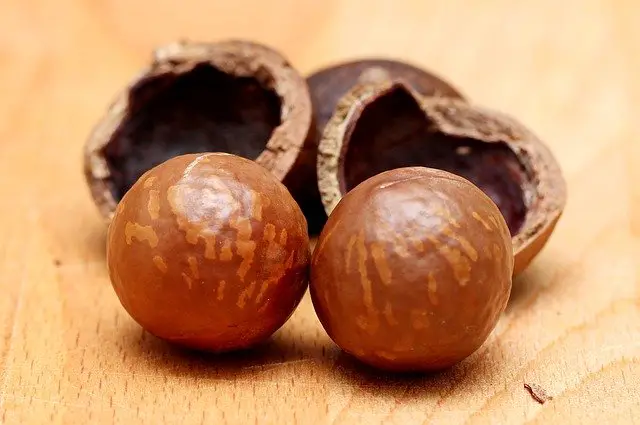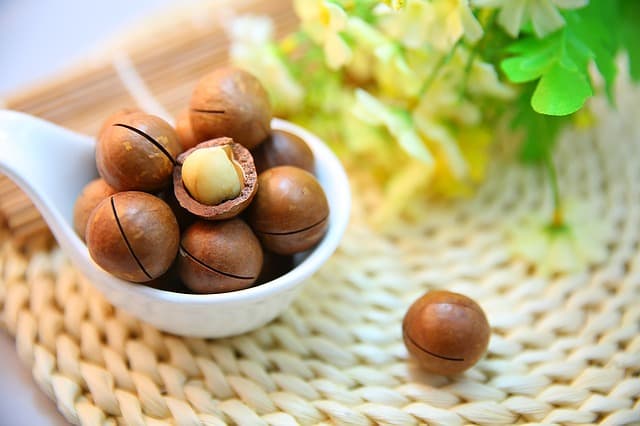Macadamia nuts have a hard shell before processing. They come from macadamia trees that fall in the family Proteaceae. The crop originated from Australia, specifically in southeastern Queensland and northeastern New South Wales, and spread elsewhere.
Although the name macadamia is known worldwide, these nuts are sometimes referred to as Hawaii nut or Queensland nut in reference to their place of cultivation. Over time, macadamia nuts have grown in popularity owing to their presentation as a superfood.
The superfood label comes from the fact that this nut is rich in essential vitamins and minerals. For instance, macadamia provides thiamine and manganese in quantities beyond the recommended daily intake. In addition, these nuts contain vitamin B6, riboflavin, magnesium, calcium, phosphorus, potassium, folate, niacin, copper, zinc, sodium, iron, selenium, vitamin C, and pantothenic acid.
They also serve as a good source of protein, fat, dietary fiber, and low carbohydrates. The high-fat content and low carbohydrates make macadamia nuts keto-friendly, meaning that one can include them in a keto diet.
Generally, macadamia nuts have a higher total fat content than most types of nuts, including cashews, pistachios, almonds, peanuts, and walnuts. However, they largely contain monounsaturated fats that have numerous health benefits. In fact, over 75 percent of the total fat content in these nuts is monounsaturated fats.

Health Benefits of Macadamia Nuts
Improve Heart Health
Macadamia nuts have high quantities of monounsaturated fats that contribute to better cardiovascular health. The consumption of 8–42 g of macadamia nuts everyday leads to about 10 percent reduction in the levels of bad cholesterol often implicated in the onset of cardiovascular disease.
Promote Weight Loss
Macadamia nuts can help in weight management. These nuts contain a lot of fiber and protein that provide a greater feeling of satiety, thus helping reduce food intake. Besides, macadamia nuts contain palmitoleic acid, a type of omega-7 fatty acid that aids in weight loss.
Cancer Prevention
Macadamia nuts have anticancer properties because they have tocotrienols and flavonoids. Tocotrienols help in cancer prevention due to their strong antioxidant properties. On the other hand, flavonoids assist by eliminating the free radicals often implicated in the onset of cancer.
Improve Brain Health
Macadamia nuts contain tocotrienols, a type of antioxidant that possess brain-protecting properties. Tocotrienols guard brain cells against the damaging effects associated with glutamate. As a result, these antioxidants prevent the onset of brain disorders such as the Alzheimer’s disease.
Diabetes Management and Prevention
The inclusion of macadamia nuts in the diet also helps people with diabetes to improve glycemic control. These nuts particularly play a key role in lowering the fasting blood sugars. According to a recent study, consuming 56 g or about 2 ounces of tree nuts daily that include macadamia nuts for 8 weeks leads a significant reduction in fasting glucose levels.
Macadamia nuts generally have a low glycemic index, making them just the right food for diabetic people. The high monounsaturated fats also help people with diabetes improve their high-density lipoproteins or good cholesterol levels, including their overall lipid profile. A favorable lipid profile generally promotes bodyweight management and reduces risk factors for cardiovascular disease.
Boost Gastrointestinal Health
The consumption of macadamia nuts also contributes to better gastrointestinal health. These nuts contain a significant amount of fiber that serves as a substrate for good gut bacteria. In turn, these bacteria provide short-chain fatty acids that help in managing inflammation in the stomach. As a result, macadamia nuts help in the prevention of inflammatory gastrointestinal disorders such as Crohn’s disease.
Why Macadamia Nuts are So Expensive?
Macadamia nuts generally cost more than different types of nuts grown today. Their price is relatively higher because macadamia trees take up to 12 years before producing their first harvest. Simply reaching nut-bearing age also does not guarantee a quality product. The highly heterozygous nature of this crop might cause uncertainty around nut quality, meaning that only a small proportion of the harvest usually gets to the market.
Preparing Processed/Roasted Macadamia Nuts
Processed or roasted macadamia nuts usually require proper preparation to soften them and boost digestion. They generally need a short-soak lasting about 2-4 hours to make nutrients more available and easy to absorb. You should not soak macadamia nuts in water for more than 4 hours because doing so can contribute to the loss of essential nutrients.



Hawaii offers at least 20 ways of snacking on macadamia nuts. I think I could eat my weight in them. lol 😋🍂
Thank you for your insights, I didn’t know you could snack on macadamia nuts in so many ways. 😃😃
My favorite is the dark chocolate sea salt caramel crisp macadamia nuts. I know, right? 😜🍂
It is good to hear you have had some good experiences with macadamia nuts. They’re just life itself when you consume them. You always get to appreciate what nature offers us. 😜
Macadamia nuts are high in healthy fats and one of the lowest in carbs. So, they make an ideal snack for diabetics. However, in addition to this, nuts are extremely high in minerals that can help reduce insulin resistance. This, along with feeling full, likely contribute to the overall fasting blood sugar reduction.
I couldn’t agree more. Nuts are generally a good addition to the diet because they improve heart health and aid in weight management for diabetics.
Great info 💕
Thank you!
This is great info about the Macadamia nut. Thanks, and I will definitely include it in my eating habits.
I am glad you found my this article on macadamia nuts informative. You should definitely include macadamia nuts in your diet because the high content of monounsaturated fats help keep your heart healthy.
Macadamia nuts are one of my favourite types of nuts. They are delicious and nutritious! Thanks for sharing.
Thank you! I am glad to hear you regularly eat macadamia nuts and get to enjoy their health benefits.
CONGRATULATIONS in advance for 200 followers 😊
CONGRATULATIONS for 200 followers 🍰🍰🎂🎂👏👏
Thank you Sudarshan Paliwal!🙏🙏
Welcome 🙂😇
Perfect.
How to prepair? Does any body soak nuts for the acid to come out? I find they are much easier on my teeth and gums after soaking too
In most cases, macadamia nuts are cracked and packaged before selling. Macadamia nuts may require a short-soak for about 2-4 hours to improve the availability and absorption of the nutrients in them. You should avoid soaking macadamia nuts for more than 4 hours because this can lead to nutritional loss.